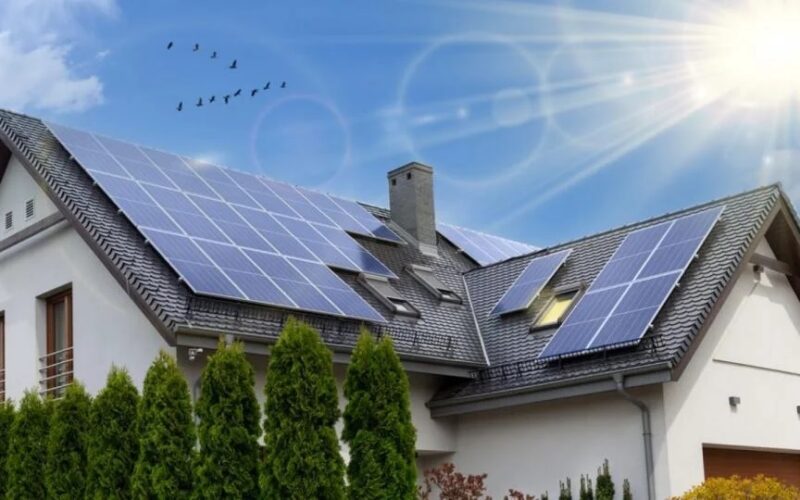Solar Panels: Harnessing Clean Energy from the Sun
In a world that increasingly values sustainability and green initiatives, solar panels have emerged as a leading source of renewable energy. Harnessing the power of the sun, these innovative devices have the potential to revolutionize the way we generate electricity. This article delves into the fascinating world of solar panels, exploring how they work, their benefits, and their impact on the environment.
What are Solar Panels?
Solar panels, also known as photovoltaic (PV) panels, are devices that convert sunlight into electricity. They consist of multiple solar cells made from semiconductor materials like silicon. When exposed to sunlight, these cells initiate the photovoltaic effect, generating a flow of electrons, which creates a direct current (DC) of electricity.
The Science behind Solar Panels
Photovoltaic Effect
The photovoltaic effect is the fundamental principle behind solar panels. It involves the transformation of light energy into electrical energy. When photons from sunlight strike the solar cell, they excite electrons, releasing them from their atoms. This creates an electric current that can be harnessed as usable energy.
Types of Solar Panels
There are three main types of solar panels: monocrystalline, polycrystalline, and thin-film. Monocrystalline panels are highly efficient and sleek, while polycrystalline panels are more affordable but slightly less efficient. Thin-film panels are flexible and lightweight, making them ideal for specific applications.
Efficiency and Conversion Rates
Solar panel efficiency refers to the amount of sunlight the panel can convert into electricity. Higher efficiency panels produce more power per square meter, making them desirable for installations with limited space. Improvements in solar technology continue to increase the efficiency of modern panels.
Benefits of Solar Panels
Renewable and Sustainable Energy
Solar energy is a renewable resource, meaning it is continuously available and inexhaustible. Unlike fossil fuels, solar power does not produce harmful emissions, making it a sustainable choice for the environment.
Reduced Electricity Bills
By harnessing solar energy, homeowners and businesses can significantly reduce their dependence on the grid, leading to substantial cost savings on electricity bills.
Low Maintenance Costs
Solar panels have minimal moving parts, requiring little maintenance. Regular cleaning and occasional checks are usually sufficient to keep them operating efficiently.
Energy Independence
Solar panels empower individuals and communities to produce their own electricity, reducing reliance on centralized power sources and promoting energy independence.
Solar Panel Installation
Site Assessment
Before installing solar panels, a thorough site assessment is essential to determine factors like sunlight exposure, shading, and orientation for optimal performance.
Mounting Options
Solar panels can be mounted on rooftops, ground-mounted in open spaces, or even integrated into building facades, offering flexibility in installation.
Wiring and Connection
Proper wiring and connection to an inverter are crucial to ensure the converted DC electricity becomes usable AC electricity for homes and businesses.
Solar Incentives and Rebates
Government Incentive Programs
Many governments around the world offer financial incentives and subsidies to encourage the adoption of solar panels.
Tax Credits and Rebates
Homeowners and businesses may qualify for tax credits and rebates that can significantly offset the initial cost of installing solar panels.
Environmental Impact
Reducing Carbon Footprint
Solar energy production produces no greenhouse gas emissions, contributing to the global efforts to combat climate change.
Minimizing Air Pollution
By relying on solar power, we reduce the need for fossil fuel combustion, thus lowering harmful air pollutants.
Conserving Water Resources
Unlike traditional power plants, solar panels do not require water for cooling, conserving this precious natural resource.
Solar Energy Storage Solutions
Battery Technology
Storing excess energy in batteries allows homeowners and businesses to use solar power during non-sunny periods.
Grid Connection and Net Metering
Connecting solar panel systems to the grid enables the export of surplus energy, earning credits or payments from utility companies.
Solar Panels for Residential Use
Rooftop Solar Systems
Rooftop installations are common for residential buildings, making efficient use of available space.
Off-Grid Solutions
Remote areas can benefit from off-grid solar solutions, providing access to electricity in locations with no utility infrastructure.
Solar Panels for Commercial Use
Solar Farms and Power Plants
Large-scale solar farms and power plants contribute significantly to renewable energy production.
Industrial Applications
Industries can integrate solar panels into their operations to reduce operating costs and environmental impact.
The Future of Solar Panels
Technological Advancements
Ongoing research and innovation are driving advancements in solar panel technology, promising even higher efficiency and lower costs.
Integration with Smart Grids
Solar panels will play a vital role in smart grid systems, promoting efficient energy management and distribution.
Debunking Common Myths about Solar Panels
Do Solar Panels Work in Cloudy Weather?
Solar panels can still produce energy on overcast days, although their output may be slightly reduced.
Are Solar Panels Expensive?
While initial costs exist, long-term savings on electricity bills often offset the initial investment.
Do Solar Panels Require High Maintenance?
Solar panels have low maintenance needs, requiring only occasional cleaning and inspections.
Tips for Choosing the Right Solar Panel System
Assessing Energy Needs
Understanding energy consumption helps determine the appropriate solar panel system size.
Evaluating Panel Efficiency
Choosing high-efficiency panels ensures better energy production.
Researching Reputable Manufacturers
Selecting reliable manufacturers guarantees quality and performance.
Challenges and Limitations
Intermittent Energy Generation
Solar power depends on sunlight availability, making it intermittent and challenging to predict.
Storage Limitations
Current battery technology has limitations in storing large amounts of energy.
Land Use and Aesthetics
Large solar installations may require significant land use, raising concerns about aesthetics and conservation.
The Global Adoption of Solar Panels
Leading Countries in Solar Energy
Countries like China, the United States, and Germany lead in solar energy production and adoption.
Overcoming Barriers to Adoption
Challenges in policy, cost, and public awareness need to be addressed to accelerate solar panel adoption globally.
Solar panels are a transformative technology that paves the way toward a more sustainable and greener future. As we harness the power of the sun, we reduce our reliance on finite fossil fuels, combat climate change, and create a cleaner environment for generations to come. Embracing solar energy is not only a responsible choice but also a practical one that benefits both individuals and the planet.
Can I install solar panels myself?
Installing solar panels is a complex process that typically requires professional expertise. It involves precise positioning, electrical connections, and adherence to building codes and safety regulations. It is best to consult experienced solar installers for a safe and efficient installation, ensuring optimal performance and longevity of the solar system.
How long do solar panels last?
Solar panels are designed to be durable and can last for many years. The average lifespan of most solar panels is around 25 to 30 years, though some high-quality panels can last even longer with proper maintenance. Regular inspections, cleaning, and timely repairs, if needed, can help maximize their efficiency and extend their lifespan.
Will solar panels work during a power outage?
The ability of solar panels to work during a power outage depends on the type of solar panel system installed. Grid-tied systems, which are the most common, automatically shut down to prevent accidents when the grid is down. However, certain systems equipped with battery storage, known as hybrid or off-grid systems, can provide backup power during power outages, ensuring continuous electricity supply for critical appliances and devices.
Are solar panels recyclable?
Yes, solar panels are recyclable, and their components can be repurposed to create new panels or other products. The recycling process involves separating the glass, aluminum, and silicon-based cells to be reused in various industries. Solar panel manufacturers and recycling facilities often take responsibility for recycling end-of-life panels to minimize environmental impact.
Are there any additional incentives for solar panel owners?
In many regions, there are additional incentives and benefits for solar panel owners. One such incentive is feed-in tariffs, where solar panel owners can sell excess electricity generated by their solar system back to the grid. This enables them to earn additional income or receive credits on their electricity bills, making solar energy even more economically advantageous. Additionally, some governments offer tax credits, rebates, or grants to promote the adoption of solar energy and support renewable energy initiatives.


